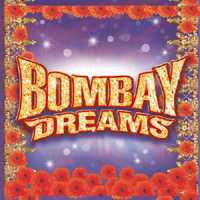 Original London Cast, 2002 (Sony)
Original London Cast, 2002 (Sony)  (3 / 5) This is the world’s first pop-rock, English-Hindi-Punjabi stage musical — but it isn’t as exotic as it sounds. Andrew Lloyd Webber produced the show, “based on an idea” that he and Shekar Kapur devised, about a naif finding fame in the hyperactive Bombay film industry known as Bollywood. Like most Lloyd Webber shows, Bombay Dreams is big on spectacle (the saris! the fountains!) but short on logic; it exists mainly as a showcase for a popular young composer, in this case, A. R. Rahman, who has written the music for dozens of Bollywood films. Rahman is a real talent with a lively gift for melody and a wide palette of styles. The recording opens with quiet mystery: Chords waft in as chant-like singing creates an atmosphere of suspense, then you can practically hear the smoke clearing as the slums of Bombay (now called Mumbai) awaken. The pace picks up and a beguiling tune kicks in, along with Don Black’s leaden lyrics, as the ambitious hero Akaash (Raza Jaffrey) dreams of stardom: “Like an eagle was born to fly, ride across the open sky / I was born to be seen on a screen in Bollywood.” And then the show plows through the expected: good guys versus bad, concerned families, broad humor, splashy musical numbers. It all adds up to a boy-meets-girl, boy-loses-girl, eunuch-sings-about-love musical. With breathy voices given digital treatments a la Cher, the album has a trendy pop sound that’s impossible to resist. The lyrics of “Shakalaka Baby” are silly, yet the song is infectious and lots of fun. (Note: A revised version of Bombay Dreams, with a book adapted by Thomas Meehan and some new songs, opened on Broadway in 2004 and ran for eight months, but did not yield a cast recording.) — Robert Sandla
(3 / 5) This is the world’s first pop-rock, English-Hindi-Punjabi stage musical — but it isn’t as exotic as it sounds. Andrew Lloyd Webber produced the show, “based on an idea” that he and Shekar Kapur devised, about a naif finding fame in the hyperactive Bombay film industry known as Bollywood. Like most Lloyd Webber shows, Bombay Dreams is big on spectacle (the saris! the fountains!) but short on logic; it exists mainly as a showcase for a popular young composer, in this case, A. R. Rahman, who has written the music for dozens of Bollywood films. Rahman is a real talent with a lively gift for melody and a wide palette of styles. The recording opens with quiet mystery: Chords waft in as chant-like singing creates an atmosphere of suspense, then you can practically hear the smoke clearing as the slums of Bombay (now called Mumbai) awaken. The pace picks up and a beguiling tune kicks in, along with Don Black’s leaden lyrics, as the ambitious hero Akaash (Raza Jaffrey) dreams of stardom: “Like an eagle was born to fly, ride across the open sky / I was born to be seen on a screen in Bollywood.” And then the show plows through the expected: good guys versus bad, concerned families, broad humor, splashy musical numbers. It all adds up to a boy-meets-girl, boy-loses-girl, eunuch-sings-about-love musical. With breathy voices given digital treatments a la Cher, the album has a trendy pop sound that’s impossible to resist. The lyrics of “Shakalaka Baby” are silly, yet the song is infectious and lots of fun. (Note: A revised version of Bombay Dreams, with a book adapted by Thomas Meehan and some new songs, opened on Broadway in 2004 and ran for eight months, but did not yield a cast recording.) — Robert Sandla
Category Archives: A-C
The Boy From Oz
 Original Australian Cast, 1998 (EMI)
Original Australian Cast, 1998 (EMI)  (3 / 5) Peter Allen wrote only one musical — the inane Legs Diamond, still prized by connoisseurs of flops — but his life story plays itself out in this glossy show. The Boy From Oz is a fast-paced biography and the first home-grown Australian musical theater hit. It traces Allen’s life from his tap dancing, piano-playing youth through his career as pop songwriter, showman, and celebrity gadabout. His meteoric rise to fame ended with his death from AIDS in 1992. The musical covers Allen’s work with Judy Garland, his marriage to Liza Minnelli, and, to no one’s surprise but his own, his belated realization that he was gay. Nick Enright’s flimsy book shoehorns Allen’s songs into dramatic contexts with varying success. “When I Get My Name in Lights” (from Legs Diamond) works well for the young Peter (Mathew Waters). Todd McKenney is charming and engaged as the adult Allen, with a reedy tenor that sails through the anthemic “I Still Call Australia Home.” Chrissie Amphlett makes an interesting Garland — she and McKenney have great rapport in “Only an Older Woman” — while Angela Toohey’s Liza is a dizzy whirlwind. Bits of the script heard on the recording, such as a news flash about the Stonewall Riots, give context to Allen’s growing self-knowledge. Although the album has an earnest, unpretentious feel, Allen’s original renditions of his songs are catchier than these, and no one can beat Olivia Newton-John’s version of “I Honestly Love You” for syrupy bathos. Still, this is a fun album, hokey but warm-hearted. — Robert Sandla
(3 / 5) Peter Allen wrote only one musical — the inane Legs Diamond, still prized by connoisseurs of flops — but his life story plays itself out in this glossy show. The Boy From Oz is a fast-paced biography and the first home-grown Australian musical theater hit. It traces Allen’s life from his tap dancing, piano-playing youth through his career as pop songwriter, showman, and celebrity gadabout. His meteoric rise to fame ended with his death from AIDS in 1992. The musical covers Allen’s work with Judy Garland, his marriage to Liza Minnelli, and, to no one’s surprise but his own, his belated realization that he was gay. Nick Enright’s flimsy book shoehorns Allen’s songs into dramatic contexts with varying success. “When I Get My Name in Lights” (from Legs Diamond) works well for the young Peter (Mathew Waters). Todd McKenney is charming and engaged as the adult Allen, with a reedy tenor that sails through the anthemic “I Still Call Australia Home.” Chrissie Amphlett makes an interesting Garland — she and McKenney have great rapport in “Only an Older Woman” — while Angela Toohey’s Liza is a dizzy whirlwind. Bits of the script heard on the recording, such as a news flash about the Stonewall Riots, give context to Allen’s growing self-knowledge. Although the album has an earnest, unpretentious feel, Allen’s original renditions of his songs are catchier than these, and no one can beat Olivia Newton-John’s version of “I Honestly Love You” for syrupy bathos. Still, this is a fun album, hokey but warm-hearted. — Robert Sandla
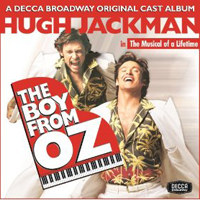 Original Broadway Cast, 2004 (Decca)
Original Broadway Cast, 2004 (Decca)  (3 / 5) The Broadway cast album of The Boy From Oz is like the Australian album on steroids: It boasts punchier orchestrations, stronger voices, and, most crucially, Hugh Jackman in the title role. All of this plus superior sound gives this recording lots of presence and oomph — just what Peter Allen was all about. Even the CD packaging is more luxurious, with crisp graphics, complete lyrics, and colorful production shots. The Broadway version retains the structure of the Australian original, but some songs have been assigned to different characters or scenes, and the show now opens with the ruminative “The Lives of Me.” None of this disguises the facts that the musical is insubstantial and Jackman was the sole reason for the Broadway production. His strong, flexible voice is full of energy, easy confidence, and star power. While his thrilling stage performance does not translate fully to the recording, he is still an engaging leading man; his “Bi-coastal” and “Everything Is New Again” shine with showbiz know-how. Isabel Keating’s Judy Garland is febrile and funny, delivered with a fine belt. Stephanie J. Block rises to the challenge of the dramatic range that the Liza character gets in this version; she seems to grow in her songs, climaxing with a frenetic “She Loves to Hear the Music.” Jarrod Emick does what he can with the treacly “I Honestly Love You,” and Beth Fowler, as Allen’s mother, is a quiet powerhouse in “Don’t Cry Out Loud.” Of the two recordings of the show, this is the one to get. — R.S.
(3 / 5) The Broadway cast album of The Boy From Oz is like the Australian album on steroids: It boasts punchier orchestrations, stronger voices, and, most crucially, Hugh Jackman in the title role. All of this plus superior sound gives this recording lots of presence and oomph — just what Peter Allen was all about. Even the CD packaging is more luxurious, with crisp graphics, complete lyrics, and colorful production shots. The Broadway version retains the structure of the Australian original, but some songs have been assigned to different characters or scenes, and the show now opens with the ruminative “The Lives of Me.” None of this disguises the facts that the musical is insubstantial and Jackman was the sole reason for the Broadway production. His strong, flexible voice is full of energy, easy confidence, and star power. While his thrilling stage performance does not translate fully to the recording, he is still an engaging leading man; his “Bi-coastal” and “Everything Is New Again” shine with showbiz know-how. Isabel Keating’s Judy Garland is febrile and funny, delivered with a fine belt. Stephanie J. Block rises to the challenge of the dramatic range that the Liza character gets in this version; she seems to grow in her songs, climaxing with a frenetic “She Loves to Hear the Music.” Jarrod Emick does what he can with the treacly “I Honestly Love You,” and Beth Fowler, as Allen’s mother, is a quiet powerhouse in “Don’t Cry Out Loud.” Of the two recordings of the show, this is the one to get. — R.S.
Bring Back Birdie
 Original Broadway Cast, 1980 (Varèse Sarabande) No stars; not recommended. What were they thinking? Clearly unaware that Elvis had left the building, the creators of Bye Bye Birdie reunited in 1980 for this misbegotten sequel, which trashed everything that was charming about the original. The cast album proves that even Charles Strouse and Lee Adams are capable of writing a lousy score. In Michael Stewart’s barely coherent story line, Albert and Rose, happily married for 20 years, search for the vanished Birdie to have him appear on a Grammy Awards telecast. They wind up in Bent River Junction, Arizona, where an overweight Birdie is the mayor and Albert’s mother, Mae, is a bartender. Meanwhile, daughter Jenny takes up with the religious cult “The Sunnies,” and son Albert, Jr. joins a band called Filth (they perform on toilets). Presiding over the mishmash is Chita Rivera — who, amazingly, never condescends to the material. For her efforts, she gets the score’s two most pleasant items, “Twenty Happy Years” and “Well, I’m Not!” Donald O’Connor does what he can with several numbers that make Albert out to be a selfish dope. Other hard workers include Maurice Hines as a private eye and Maria Karnilova as Mae; she gets the 11-o’clock number, a pointless Charleston titled “I Love ‘Em All.” As Birdie, Elvis impersonator Marcel Forestieri is amusing in “You Can Never Go Back,” words that the show’s creators might have heeded. With this as an example of what can happen when you try to make lighting strike twice, how did Strouse ever get involved with Annie Warbucks as one of his subsequent projects? — David Barbour
Original Broadway Cast, 1980 (Varèse Sarabande) No stars; not recommended. What were they thinking? Clearly unaware that Elvis had left the building, the creators of Bye Bye Birdie reunited in 1980 for this misbegotten sequel, which trashed everything that was charming about the original. The cast album proves that even Charles Strouse and Lee Adams are capable of writing a lousy score. In Michael Stewart’s barely coherent story line, Albert and Rose, happily married for 20 years, search for the vanished Birdie to have him appear on a Grammy Awards telecast. They wind up in Bent River Junction, Arizona, where an overweight Birdie is the mayor and Albert’s mother, Mae, is a bartender. Meanwhile, daughter Jenny takes up with the religious cult “The Sunnies,” and son Albert, Jr. joins a band called Filth (they perform on toilets). Presiding over the mishmash is Chita Rivera — who, amazingly, never condescends to the material. For her efforts, she gets the score’s two most pleasant items, “Twenty Happy Years” and “Well, I’m Not!” Donald O’Connor does what he can with several numbers that make Albert out to be a selfish dope. Other hard workers include Maurice Hines as a private eye and Maria Karnilova as Mae; she gets the 11-o’clock number, a pointless Charleston titled “I Love ‘Em All.” As Birdie, Elvis impersonator Marcel Forestieri is amusing in “You Can Never Go Back,” words that the show’s creators might have heeded. With this as an example of what can happen when you try to make lighting strike twice, how did Strouse ever get involved with Annie Warbucks as one of his subsequent projects? — David Barbour
Brigadoon
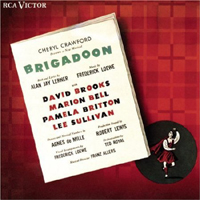 Original Broadway Cast, 1947 (RCA)
Original Broadway Cast, 1947 (RCA)  (5 / 5) This is one of the most exciting cast albums of the pre-LP era. It was RCA’s first stab at Broadway, and although the mono sound is antique by today’s standards, it’s crisp for its day. The orchestra seems augmented for the recording, and Franz Allers’ conducting is rousing. David Brooks plays Tommy, a world-weary romantic who, with his cynical friend Jeff, stumbles upon a Scottish village that comes to life for only one day every 100 years. Tommy falls in love with the lass Fiona, played by Marion Bell. The two leads combine legitimate vocal training and a full-bodied Broadway sound with believable acting and unaffected diction, soaring through such magnificent Alan Jay Lerner-Frederick Loewe songs as “The Heather on the Hill” and “Almost Like Being in Love.” Lee Sullivan as Charlie Dalrymple delivers impeccable renditions of ”I’ll Go Home With Bonnie Jean” and the wistful ballad “Come to Me, Bend to Me.” Since these recordings were originally released as a 78-rpm set, the score is truncated, but the cuts were made so carefully that the album doesn’t sound incomplete — except for the excision of the character Meg Brockie’s wonderfully witty Act I number “The Love of My Life.” What we have here is a vibrant reading of highlights of a great score that has all the freshness of a new Broadway smash by two songwriters who went on to more than fulfill their promise. — Gerard Alessandrini
(5 / 5) This is one of the most exciting cast albums of the pre-LP era. It was RCA’s first stab at Broadway, and although the mono sound is antique by today’s standards, it’s crisp for its day. The orchestra seems augmented for the recording, and Franz Allers’ conducting is rousing. David Brooks plays Tommy, a world-weary romantic who, with his cynical friend Jeff, stumbles upon a Scottish village that comes to life for only one day every 100 years. Tommy falls in love with the lass Fiona, played by Marion Bell. The two leads combine legitimate vocal training and a full-bodied Broadway sound with believable acting and unaffected diction, soaring through such magnificent Alan Jay Lerner-Frederick Loewe songs as “The Heather on the Hill” and “Almost Like Being in Love.” Lee Sullivan as Charlie Dalrymple delivers impeccable renditions of ”I’ll Go Home With Bonnie Jean” and the wistful ballad “Come to Me, Bend to Me.” Since these recordings were originally released as a 78-rpm set, the score is truncated, but the cuts were made so carefully that the album doesn’t sound incomplete — except for the excision of the character Meg Brockie’s wonderfully witty Act I number “The Love of My Life.” What we have here is a vibrant reading of highlights of a great score that has all the freshness of a new Broadway smash by two songwriters who went on to more than fulfill their promise. — Gerard Alessandrini
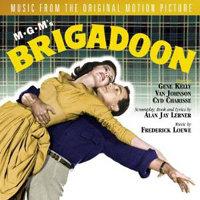 Film Soundtrack, 1954 (MGM/Rhino-Turner)
Film Soundtrack, 1954 (MGM/Rhino-Turner)  (2 / 5) MGM’s screen version of Brigadoon was misguided in many ways. Lerner and Loewe’s great score is not well served here. The orchestrations sound transparent and timid, and the casting of Gene Kelly and Cyd Charisse in what were rich singing roles in the Broadway show transformed them into dancing roles, causing some beautiful ballads to be discarded. Also cut were both of Meg Brockie’s songs, because they were considered too risqué for 1954 movie audiences. However, some of what remains is robustly performed. The dance music will entertain those who love “The MGM Musical Sound,” and if you’re a big Gene Kelly fan, you may enjoy Rhino’s expanded CD, which includes Kelly’s renditions of the cut songs “There But for You Go I” and “From This Day On.” Also included is another number that was excised from the film, “Come to Me, Bend to Me,” sweetly sung by John Gustafsen, who dubbed for Jimmie Thompson. But this isn’t Brigadoon as we all know and love it. — G.A.
(2 / 5) MGM’s screen version of Brigadoon was misguided in many ways. Lerner and Loewe’s great score is not well served here. The orchestrations sound transparent and timid, and the casting of Gene Kelly and Cyd Charisse in what were rich singing roles in the Broadway show transformed them into dancing roles, causing some beautiful ballads to be discarded. Also cut were both of Meg Brockie’s songs, because they were considered too risqué for 1954 movie audiences. However, some of what remains is robustly performed. The dance music will entertain those who love “The MGM Musical Sound,” and if you’re a big Gene Kelly fan, you may enjoy Rhino’s expanded CD, which includes Kelly’s renditions of the cut songs “There But for You Go I” and “From This Day On.” Also included is another number that was excised from the film, “Come to Me, Bend to Me,” sweetly sung by John Gustafsen, who dubbed for Jimmie Thompson. But this isn’t Brigadoon as we all know and love it. — G.A.
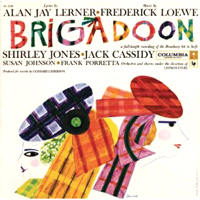 Studio Cast, 1957 (Columbia/Sony)
Studio Cast, 1957 (Columbia/Sony)  (4 / 5) Here is one of the best studio cast albums of the 1950s, conducted by the great Lehman Engel. The orchestral and choral work is excellent, and the cast is strong — especially the female leads. Shirley Jones is the embodiment of Fiona, but the most thrilling bit of casting is Susan Johnson as Meg; both of that colorful character’s great comic songs, “The Love of My Life” and “My Mother’s Weddin’ Day,” are here in their raunchy entirety, and Johnson’s delivery of Lerner’s witty lyrics is brassy and brilliant. As for the men, Jack Cassidy brings star power to the role of Tommy, but some listeners may feel that he doesn’t have quite the right sort of legit Broadway voice for these songs; and Frank Poretta as Charlie, although a fine tenor, arguably sounds too mature for this boyish part. — G.A.
(4 / 5) Here is one of the best studio cast albums of the 1950s, conducted by the great Lehman Engel. The orchestral and choral work is excellent, and the cast is strong — especially the female leads. Shirley Jones is the embodiment of Fiona, but the most thrilling bit of casting is Susan Johnson as Meg; both of that colorful character’s great comic songs, “The Love of My Life” and “My Mother’s Weddin’ Day,” are here in their raunchy entirety, and Johnson’s delivery of Lerner’s witty lyrics is brassy and brilliant. As for the men, Jack Cassidy brings star power to the role of Tommy, but some listeners may feel that he doesn’t have quite the right sort of legit Broadway voice for these songs; and Frank Poretta as Charlie, although a fine tenor, arguably sounds too mature for this boyish part. — G.A.
 Television Cast, 1966 (Columbia Special Projects/Sony)
Television Cast, 1966 (Columbia Special Projects/Sony)  (2 / 5) This recording contains only nine songs from the Brigadoon score, eliminating both of Meg Brockie’s songs as well as the opening chorus (“Once in the Highlands”), “Jeannie’s Packin’ Up,” “The Chase” sequence, the Wedding Dance, and the Sword Dance. The songs that were retained are presented on this album in some weird, random order, rather than as they appeared in the Broadway show and in the actual 1966 TV broadcast. Most of the keys have been significantly lowered from the originals, and the arrangements and orchestrations sound much more “pop” than “musical theater.” All of that makes this come across as more of an enjoyable, mid-’60s pop album of songs from Brigadoon than a cast recording, but the presence of Robert Goulet and Sally Ann Howes in the roles of Tommy and Fiona does give it some theater cred. Both sound glorious here, even in the lower keys, and someone named Tommy Carlisle does a lovely job with Charlie Dalrymple’s “I’ll Go Home With Bonnie Jean” and “Come to Me, Bend to Me.” Marlyn Mason delivers Meg Brockie’s few sung lines in “McConnachy Square” with enough charisma that it’s a shame she wasn’t given a shot at “The Love of My Life” and “My Mother’s Weddin’ Day.” [Note: This recording as originally released on LP had such a brief running time that it was later combined with the cast album of the 1968 TV version of Kiss Me, Kate, in which Goulet also starred, for Sony’s single-disc CD release.] — Michael Portantiere
(2 / 5) This recording contains only nine songs from the Brigadoon score, eliminating both of Meg Brockie’s songs as well as the opening chorus (“Once in the Highlands”), “Jeannie’s Packin’ Up,” “The Chase” sequence, the Wedding Dance, and the Sword Dance. The songs that were retained are presented on this album in some weird, random order, rather than as they appeared in the Broadway show and in the actual 1966 TV broadcast. Most of the keys have been significantly lowered from the originals, and the arrangements and orchestrations sound much more “pop” than “musical theater.” All of that makes this come across as more of an enjoyable, mid-’60s pop album of songs from Brigadoon than a cast recording, but the presence of Robert Goulet and Sally Ann Howes in the roles of Tommy and Fiona does give it some theater cred. Both sound glorious here, even in the lower keys, and someone named Tommy Carlisle does a lovely job with Charlie Dalrymple’s “I’ll Go Home With Bonnie Jean” and “Come to Me, Bend to Me.” Marlyn Mason delivers Meg Brockie’s few sung lines in “McConnachy Square” with enough charisma that it’s a shame she wasn’t given a shot at “The Love of My Life” and “My Mother’s Weddin’ Day.” [Note: This recording as originally released on LP had such a brief running time that it was later combined with the cast album of the 1968 TV version of Kiss Me, Kate, in which Goulet also starred, for Sony’s single-disc CD release.] — Michael Portantiere
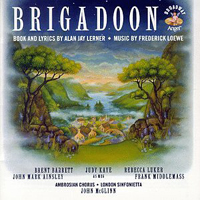 Studio Cast, 1992 (Angel)
Studio Cast, 1992 (Angel)  (4 / 5) If you’re looking for a complete recording of Brigadoon in modern digital sound, here it is. The London Sinfonietta lovingly performs every bar of the score, and the cast is top-notch. Conductor John McGlinn presents the songs in a most lyrical, lush setting, achieving the perfection of a fine classical music recording. As Tommy, Brent Barrett sounds gorgeous. Rebecca Luker is just as well cast; she glides through Fiona’s numbers blissfully, her standout performance being “Waitin’ for My Dearie.” John Mark Ainsley is first-rate as Charlie in “I’ll Go Home With Bonnie Jean” and “Come to Me, Bend to Me,” and Judy Kaye is a terrific Meg, giving her character’s comic turns just the right amount of sass. Most of the ensemble work is excellent, although some of the chorus members sound a bit too operatic in their solo lines, and McGlinn’s conducting is impeccable. — G.A.
(4 / 5) If you’re looking for a complete recording of Brigadoon in modern digital sound, here it is. The London Sinfonietta lovingly performs every bar of the score, and the cast is top-notch. Conductor John McGlinn presents the songs in a most lyrical, lush setting, achieving the perfection of a fine classical music recording. As Tommy, Brent Barrett sounds gorgeous. Rebecca Luker is just as well cast; she glides through Fiona’s numbers blissfully, her standout performance being “Waitin’ for My Dearie.” John Mark Ainsley is first-rate as Charlie in “I’ll Go Home With Bonnie Jean” and “Come to Me, Bend to Me,” and Judy Kaye is a terrific Meg, giving her character’s comic turns just the right amount of sass. Most of the ensemble work is excellent, although some of the chorus members sound a bit too operatic in their solo lines, and McGlinn’s conducting is impeccable. — G.A.
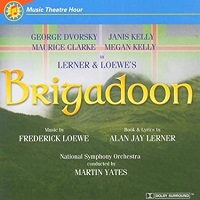 Studio Cast, 1999 (JAY)
Studio Cast, 1999 (JAY)  (3 / 5) While many of the JAY company’s studio recordings of classic musicals are note-complete presentations of the respective scores, this album is a more traditional compilation of the songs, for the most part eschewing the show’s dance music, scene transitions, etc. — although the extended dance section of “I’ll Go Home With Bonnie Jean” and the entr’acte are both included. Interestingly, this recording employs the character surnames that were swapped in for the original London production of Brigadoon in order to comport with authentic Scottish clan names. (Apparently, Alan Jay Lerner had failed to do his research in this regard, just as he had not studied British speech well enough to avoid using some American English phrases in his lyrics for My Fair Lady.) Thus, the MacLarens are here the MacKeiths, Charlie Dalrymple is Charlie Cameron, and so on. But since the only surnames sung in the lyrics are “Harry Beaton” (now “Harry Ritchie”) and the list of names in “My Mother’s Wedding Day,” this change is mostly evident from reading the cast of characters list in the notes for the album. Yet another anomaly: While George Dvorsky sings the leading male role of Tommy Albright on the edition of the recording that was distributed in the U.S., Ethan Freeman is heard on the version that was issued in the U.K. and elsewhere in Europe. Dvorsky does a lovely job with Tommy’s songs in the excellent, authentically Scottish company of Janis Kelly as Fiona, Megan Kelly as Meg, and Maurice Clarke as Charlie. Once past a somnolent tempo for the choral prologue, Martin Yates conducts the National Symphony Orchestra and the singers with skill and sensitivity. — M.P.
(3 / 5) While many of the JAY company’s studio recordings of classic musicals are note-complete presentations of the respective scores, this album is a more traditional compilation of the songs, for the most part eschewing the show’s dance music, scene transitions, etc. — although the extended dance section of “I’ll Go Home With Bonnie Jean” and the entr’acte are both included. Interestingly, this recording employs the character surnames that were swapped in for the original London production of Brigadoon in order to comport with authentic Scottish clan names. (Apparently, Alan Jay Lerner had failed to do his research in this regard, just as he had not studied British speech well enough to avoid using some American English phrases in his lyrics for My Fair Lady.) Thus, the MacLarens are here the MacKeiths, Charlie Dalrymple is Charlie Cameron, and so on. But since the only surnames sung in the lyrics are “Harry Beaton” (now “Harry Ritchie”) and the list of names in “My Mother’s Wedding Day,” this change is mostly evident from reading the cast of characters list in the notes for the album. Yet another anomaly: While George Dvorsky sings the leading male role of Tommy Albright on the edition of the recording that was distributed in the U.S., Ethan Freeman is heard on the version that was issued in the U.K. and elsewhere in Europe. Dvorsky does a lovely job with Tommy’s songs in the excellent, authentically Scottish company of Janis Kelly as Fiona, Megan Kelly as Meg, and Maurice Clarke as Charlie. Once past a somnolent tempo for the choral prologue, Martin Yates conducts the National Symphony Orchestra and the singers with skill and sensitivity. — M.P.
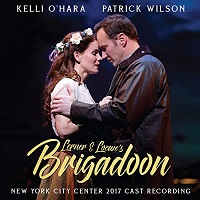 Encores! Cast, 2018 (Ghostlight)
Encores! Cast, 2018 (Ghostlight)  (4 / 5) Here’s a valuable aural document of one of the most moving and thrilling staged concert presentations of Brigadoon that one could ever hope to see. Kelli O’Hara and Patrick Wilson are sheer perfection in the leads; with her lush soprano, superb acting ability, and organic-sounding Scottish accent, O’Hara is a Fiona for the ages, while Wilson’s gorgeous, ringing baritenor and wonderfully natural way with spoken dialogue make him the ideal Tommy. Stephanie Block is spot-on luxury casting as Meg, and Ross Lekites sings Charlie’s songs with a melting beauty to rival the best of his recorded predecessors. Rob Berman conducts the large orchestra with a marvelously theatrical sense of forward motion, and the ensemble is exceptionally strong, whether its members are singing as a group or persuasively delivering solo lines in such songs as “Down on MacConnachy Square,” “Waitin’ for My Dearie,” and “The Chase.” Some listeners will miss the opening chorale “Once in the highlands….” and the charming if rather twee “Jeannie’s Packin’ Up,” both cut from the production and not heard here, plus there are some other minor excisions and revisions to the score that may bother purists. But, overall, this is a treasurable cast album of a production as miraculous as the town of Brigadoon itself. — M.P.
(4 / 5) Here’s a valuable aural document of one of the most moving and thrilling staged concert presentations of Brigadoon that one could ever hope to see. Kelli O’Hara and Patrick Wilson are sheer perfection in the leads; with her lush soprano, superb acting ability, and organic-sounding Scottish accent, O’Hara is a Fiona for the ages, while Wilson’s gorgeous, ringing baritenor and wonderfully natural way with spoken dialogue make him the ideal Tommy. Stephanie Block is spot-on luxury casting as Meg, and Ross Lekites sings Charlie’s songs with a melting beauty to rival the best of his recorded predecessors. Rob Berman conducts the large orchestra with a marvelously theatrical sense of forward motion, and the ensemble is exceptionally strong, whether its members are singing as a group or persuasively delivering solo lines in such songs as “Down on MacConnachy Square,” “Waitin’ for My Dearie,” and “The Chase.” Some listeners will miss the opening chorale “Once in the highlands….” and the charming if rather twee “Jeannie’s Packin’ Up,” both cut from the production and not heard here, plus there are some other minor excisions and revisions to the score that may bother purists. But, overall, this is a treasurable cast album of a production as miraculous as the town of Brigadoon itself. — M.P.
Breakfast at Tiffany’s
 “World Premiere Cast Recording,” 2000 (Original Cast Records, 2CDs)
“World Premiere Cast Recording,” 2000 (Original Cast Records, 2CDs)  (4 / 5) This is possibly the strangest cast album ever. The show Breakfast at Tiffany’s was a notorious flop of the 1960s, undergoing tryout traumas and then flaming out after a couple of New York previews. Nobody involved knew how to adapt Truman Capote’s novella about the adventures of winsome Holly Golightly, and Philadelphia audiences expecting the fey charm of the film version (which starred Audrey Hepburn) instead got a leering sex comedy by Abe Burrows with brassy songs by Bob Merrill. In an act of desperation, producer David Merrick replaced Burrows with Edward Albee, whose weird new concept — Holly as a fictional character romancing the writer who invents her — was quickly dismissed. As the changes kept coming, Merrill kept churning out songs. This two-disc studio album, actually recorded in 1995, has 33 tracks, including the overture, entr’acte, and exit music. The notes provide synopses of both Burrows’ and Albee’s libretti, allowing you to program different versions of the score when you listen. (There are also several alternate numbers that were written on the road.) It’s a pity that all this effort wasn’t expended on a better show. The Burrows version has its moments, but even so, Holly is stripped of her charm and made into a pushy gold digger. The Albee version isn’t as crass, but is humorless, with much weaker songs. There are a few nice items, including the swingy “Holly Golightly” and “Traveling.” But too many numbers, such as “Lament for Ten Men,” “The Home for Wayward Girls,” and “The Wittiest Fellow in Pittsburgh,” are simply tasteless. (Ralph Burns’ orchestrations underline every joke, in case you’re not paying attention.) The cast features Faith Prince singing her heart out as Holly, with strong contributions by John Schneider as the writer who loves her; Hal Linden as her hayseed first husband; Ron Raines as her Mafia confidant; and, from the Broadway cast, Sally Kellerman as Holly’s friendly competitor, whose big solo, “My Nice Ways,” has a certain dirty allure. Hardcore show fans will want to give this recording a listen at least once, but don’t expect a lost masterpiece. — David Barbour
(4 / 5) This is possibly the strangest cast album ever. The show Breakfast at Tiffany’s was a notorious flop of the 1960s, undergoing tryout traumas and then flaming out after a couple of New York previews. Nobody involved knew how to adapt Truman Capote’s novella about the adventures of winsome Holly Golightly, and Philadelphia audiences expecting the fey charm of the film version (which starred Audrey Hepburn) instead got a leering sex comedy by Abe Burrows with brassy songs by Bob Merrill. In an act of desperation, producer David Merrick replaced Burrows with Edward Albee, whose weird new concept — Holly as a fictional character romancing the writer who invents her — was quickly dismissed. As the changes kept coming, Merrill kept churning out songs. This two-disc studio album, actually recorded in 1995, has 33 tracks, including the overture, entr’acte, and exit music. The notes provide synopses of both Burrows’ and Albee’s libretti, allowing you to program different versions of the score when you listen. (There are also several alternate numbers that were written on the road.) It’s a pity that all this effort wasn’t expended on a better show. The Burrows version has its moments, but even so, Holly is stripped of her charm and made into a pushy gold digger. The Albee version isn’t as crass, but is humorless, with much weaker songs. There are a few nice items, including the swingy “Holly Golightly” and “Traveling.” But too many numbers, such as “Lament for Ten Men,” “The Home for Wayward Girls,” and “The Wittiest Fellow in Pittsburgh,” are simply tasteless. (Ralph Burns’ orchestrations underline every joke, in case you’re not paying attention.) The cast features Faith Prince singing her heart out as Holly, with strong contributions by John Schneider as the writer who loves her; Hal Linden as her hayseed first husband; Ron Raines as her Mafia confidant; and, from the Broadway cast, Sally Kellerman as Holly’s friendly competitor, whose big solo, “My Nice Ways,” has a certain dirty allure. Hardcore show fans will want to give this recording a listen at least once, but don’t expect a lost masterpiece. — David Barbour
Bravo Giovanni
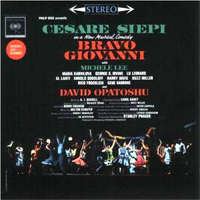 Original Broadway Cast, 1962 (Columbia/DRG)
Original Broadway Cast, 1962 (Columbia/DRG)  (3 / 5) This is a swell listen with a game cast, a lively Ronny Graham-Milton Schafer score, and the sort of floppola production numbers that are more fun than higher-reaching material in worthier musicals. A contrived tale of dueling restaurateurs in Rome, Bravo Giovanni also takes in a May-September romance (September didn’t look too bad in the person of Metropolitan Opera basso Cesare Siepi), a young Michele Lee belting “Steady, Steady” and other power ballads with intensity, and a manic Maria Karnilova flogging something called “The Kangaroo.” Siepi is strong and authoritative, especially in the winning “If I Were the Man,” and such sundry talents as George S. Irving and David Opatoshu work hard selling their substandard songs. There’s even a hit faux-Italiano ballad, “Ah! Camminare,” delivered by the reliable Broadway tenor Gene Varrone. The CD reissue has a bonus-track enticement: Lee in a rock-beat version of “Steady, Steady,” Like the show itself, it’s cheesy fun. — Marc Miller
(3 / 5) This is a swell listen with a game cast, a lively Ronny Graham-Milton Schafer score, and the sort of floppola production numbers that are more fun than higher-reaching material in worthier musicals. A contrived tale of dueling restaurateurs in Rome, Bravo Giovanni also takes in a May-September romance (September didn’t look too bad in the person of Metropolitan Opera basso Cesare Siepi), a young Michele Lee belting “Steady, Steady” and other power ballads with intensity, and a manic Maria Karnilova flogging something called “The Kangaroo.” Siepi is strong and authoritative, especially in the winning “If I Were the Man,” and such sundry talents as George S. Irving and David Opatoshu work hard selling their substandard songs. There’s even a hit faux-Italiano ballad, “Ah! Camminare,” delivered by the reliable Broadway tenor Gene Varrone. The CD reissue has a bonus-track enticement: Lee in a rock-beat version of “Steady, Steady,” Like the show itself, it’s cheesy fun. — Marc Miller
The Boys From Syracuse
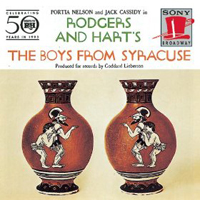 Studio Cast, 1953 (Columbia/Sony)
Studio Cast, 1953 (Columbia/Sony)  (3 / 5) Rodgers and Hart’s 1938 adaptation of The Comedy of Errors is one of their most sublime achievements. The score, melodically and harmonically unsurpassed and lyrically ingenious, has ensured frequent revivals of the show, so it’s no surprise that there are several recordings. The first, an early entry in Lehman Engel’s series of then-unrecorded musicals, is well cast and gratifyingly near complete; it even includes the entire Act II ballet. Casting Jack Cassidy as both Antipholuses (Antipholi?) is a little less fun than hiring two actors, but he’s at his vocal peak and is a persuasively sensuous balladeer; when Cassidy sings “You Have Cast Your Shadow on the Sea,” you know he’s not talking about refracted light. Portia Nelson delivers the goods in”Falling in Love With Love,” Bibi Osterwald as Luce lands all of her comic songs, and Engel conducts at a good clip. The orchestrations aren’t quite the Hans Spialek originals, but are modeled upon them. (The one exception is a bizarre, jazz-combo-backed version of “This Can’t Be Love” that Rodgers himself went on record as loathing.) Some of Columbia’s subsequent studio cast albums were mired in star casting and ’50s orchestral bloat; this one is closer to the real thing, with the correct spirit of silliness and a knockout of an overture. — Marc Miller
(3 / 5) Rodgers and Hart’s 1938 adaptation of The Comedy of Errors is one of their most sublime achievements. The score, melodically and harmonically unsurpassed and lyrically ingenious, has ensured frequent revivals of the show, so it’s no surprise that there are several recordings. The first, an early entry in Lehman Engel’s series of then-unrecorded musicals, is well cast and gratifyingly near complete; it even includes the entire Act II ballet. Casting Jack Cassidy as both Antipholuses (Antipholi?) is a little less fun than hiring two actors, but he’s at his vocal peak and is a persuasively sensuous balladeer; when Cassidy sings “You Have Cast Your Shadow on the Sea,” you know he’s not talking about refracted light. Portia Nelson delivers the goods in”Falling in Love With Love,” Bibi Osterwald as Luce lands all of her comic songs, and Engel conducts at a good clip. The orchestrations aren’t quite the Hans Spialek originals, but are modeled upon them. (The one exception is a bizarre, jazz-combo-backed version of “This Can’t Be Love” that Rodgers himself went on record as loathing.) Some of Columbia’s subsequent studio cast albums were mired in star casting and ’50s orchestral bloat; this one is closer to the real thing, with the correct spirit of silliness and a knockout of an overture. — Marc Miller
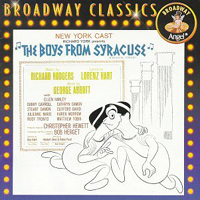 Off-Broadway Cast, 1963 (Capitol/Angel)
Off-Broadway Cast, 1963 (Capitol/Angel)  (4 / 5) The orchestrations here are scaled-down approximations of the original Spialek charts; by Off-Broadway standards, the orchestra is quite large. The cover art features that great Al Hirschfeld drawing of Jimmy Savo and Teddy Hart in the 1938 original, and what’s on the recording is pretty delectable, too. Karen Morrow’s brazen voice richly mines the comedy songs, Clifford David and Stuart Damon split the ballads ably, and Ellen Hanley breaks your heart with “Falling in Love With Love.” Also on hand are Danny Carroll, Julienne Marie, and Cathryn Damon. The Encores! album (reviewed below) may be the gold-standard recording of this score, but this one is more persuasively about hot-blooded young folks jumping into the wrong beds. — M.M.
(4 / 5) The orchestrations here are scaled-down approximations of the original Spialek charts; by Off-Broadway standards, the orchestra is quite large. The cover art features that great Al Hirschfeld drawing of Jimmy Savo and Teddy Hart in the 1938 original, and what’s on the recording is pretty delectable, too. Karen Morrow’s brazen voice richly mines the comedy songs, Clifford David and Stuart Damon split the ballads ably, and Ellen Hanley breaks your heart with “Falling in Love With Love.” Also on hand are Danny Carroll, Julienne Marie, and Cathryn Damon. The Encores! album (reviewed below) may be the gold-standard recording of this score, but this one is more persuasively about hot-blooded young folks jumping into the wrong beds. — M.M.
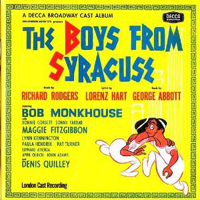 Original London Cast, 1963 (Decca)
Original London Cast, 1963 (Decca)  (3 / 5) Apparently, when The Boys From Syracuse made its belated London debut, the elements didn’t quite jell; a three-month run was all that the show could muster in the West End. But the album has good ensemble work from a big-name British cast headed by Bob Monkhouse, Denis Quilley, and Maggie Fitzgibbon. The production is a bit boisterous; all that hearty chorus laughter at Hart’s jokes tells us that the director (Christopher Hewett) didn’t trust the audience to identify the funny bits. Still, this is an above-average recording of a fabulous score. The CD reissue booklet boasts an excellent essay on the show, including a scholarly mini-course in Rodgers and Hart appreciation by John Hollander. Six vintage tracks by Frances Langford and Rudy Vallee are included on the disc as bonuses, but they’re soporific. — M.M.
(3 / 5) Apparently, when The Boys From Syracuse made its belated London debut, the elements didn’t quite jell; a three-month run was all that the show could muster in the West End. But the album has good ensemble work from a big-name British cast headed by Bob Monkhouse, Denis Quilley, and Maggie Fitzgibbon. The production is a bit boisterous; all that hearty chorus laughter at Hart’s jokes tells us that the director (Christopher Hewett) didn’t trust the audience to identify the funny bits. Still, this is an above-average recording of a fabulous score. The CD reissue booklet boasts an excellent essay on the show, including a scholarly mini-course in Rodgers and Hart appreciation by John Hollander. Six vintage tracks by Frances Langford and Rudy Vallee are included on the disc as bonuses, but they’re soporific. — M.M.
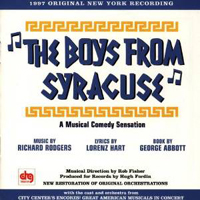 Encores! Cast, 1997 (DRG)
Encores! Cast, 1997 (DRG)  (5 / 5) A treat under any circumstances, the score of The Boys From Syracuse never sounded better than in this recording of the City Center Encores! production. First and foremost, it restores Hans Spialek’s original orchestrations, and that alone is like scraping several coats of paint off an antique that never should have been tampered with. Exquisite details emerge, like the orchestra tacet in “This Can’t Be Love” when Sarah Uriarte Berry sings that her heart “skipped a beat.” Also, this is the most complete rendition of the score on record, featuring the seldom-heard “Big Brother” and the premiere recording of “Let Antipholus In!” The casting, while not uniformly inspired, is perfectly sensible. If Debbie Gravitte as Luce never produces an unexpected inflection, she does the job, and she’s well partnered by Michael McGrath as Dromio of Ephesus; their mutual disgust in “What Can You Do With a Man?” is palpable. The strong Antipholuses are Davis Gaines and Malcom Gets. Rebecca Luker as Adriana is all that you want her to be, and Patrick Quinn injects mock-Romberg testosterone into “Come With Me.” But it’s McGrath who taps directly into the show’s spirit, as when he delivers one of my favorite Hart couplets: “Come on, crystal, act like ya know me / Come on, crystal, show me Dromie!” — M.M.
(5 / 5) A treat under any circumstances, the score of The Boys From Syracuse never sounded better than in this recording of the City Center Encores! production. First and foremost, it restores Hans Spialek’s original orchestrations, and that alone is like scraping several coats of paint off an antique that never should have been tampered with. Exquisite details emerge, like the orchestra tacet in “This Can’t Be Love” when Sarah Uriarte Berry sings that her heart “skipped a beat.” Also, this is the most complete rendition of the score on record, featuring the seldom-heard “Big Brother” and the premiere recording of “Let Antipholus In!” The casting, while not uniformly inspired, is perfectly sensible. If Debbie Gravitte as Luce never produces an unexpected inflection, she does the job, and she’s well partnered by Michael McGrath as Dromio of Ephesus; their mutual disgust in “What Can You Do With a Man?” is palpable. The strong Antipholuses are Davis Gaines and Malcom Gets. Rebecca Luker as Adriana is all that you want her to be, and Patrick Quinn injects mock-Romberg testosterone into “Come With Me.” But it’s McGrath who taps directly into the show’s spirit, as when he delivers one of my favorite Hart couplets: “Come on, crystal, act like ya know me / Come on, crystal, show me Dromie!” — M.M.
Boy Meets Boy
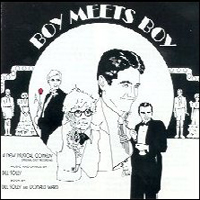 Original Off-Broadway Cast, 1974 (Records & Publishing/AEI)
Original Off-Broadway Cast, 1974 (Records & Publishing/AEI)  (2 / 5) This show dates from the mid ’70s, but its heart lies more with The Boy Friend than with The Boys in the Band. The creators took one of those cheerfully asinine 1930s musical comedy plots (globe-trotting reporter meets incognito aristocrat) and gave it a gay spin. There’s no post-Stonewall anger here, no Suddenly, Last Summer angst and self-loathing; this show is a fizzy, good-hearted romp. The missing ingredient is a true sense of style. Composer-lyricist Bill Solly came up with some competent wordplay and nice melodies, but the score is more ’70s-generic than ’30s satiny chic. That problem is exacerbated on this recording by the tinny noises of synthesized accompaniment. Still, the small cast performs enthusiastically, and if the result is not a masterful confection, it is a tasty cupcake at the very least. From today’s perspective, Boy Meets Boy seems a period piece twice over, a giddy bauble that appeared just before a very dark time in gay history began. Even nostalgia can wield a double-edged sword. — Richard Barrios
(2 / 5) This show dates from the mid ’70s, but its heart lies more with The Boy Friend than with The Boys in the Band. The creators took one of those cheerfully asinine 1930s musical comedy plots (globe-trotting reporter meets incognito aristocrat) and gave it a gay spin. There’s no post-Stonewall anger here, no Suddenly, Last Summer angst and self-loathing; this show is a fizzy, good-hearted romp. The missing ingredient is a true sense of style. Composer-lyricist Bill Solly came up with some competent wordplay and nice melodies, but the score is more ’70s-generic than ’30s satiny chic. That problem is exacerbated on this recording by the tinny noises of synthesized accompaniment. Still, the small cast performs enthusiastically, and if the result is not a masterful confection, it is a tasty cupcake at the very least. From today’s perspective, Boy Meets Boy seems a period piece twice over, a giddy bauble that appeared just before a very dark time in gay history began. Even nostalgia can wield a double-edged sword. — Richard Barrios
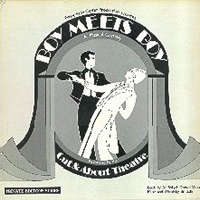 Original Minneapolis Cast, 1979 (Private Editions/no CD)
Original Minneapolis Cast, 1979 (Private Editions/no CD)  (3 / 5) Boy Meets Boy was sufficiently successful in its initial New York and Los Angeles runs to become a hot item on the burgeoning gay-regional-theater circuit of the late 1970s. (Some playgoers will recall those halcyon days of generous grants from the National Endowment for the Arts.) One company in particular, the Out & About Theatre of Minneapolis, gave Bill Solly’s show a comparatively lavish production. A special boon for the home listener is that the cast album boasts a small but bona-fide orchestra to supplant the nattering synthesizer heard on the original recording; the intrepid orchestrator Brad Callahan worked with Solly to expand the score somewhat, and the added resources give the show more of a faux-Deco sheen. A new overture, extended dance music, and an ingratiating group of performers add to the fun. Calling something “the Original Minneapolis Cast Recording” may sound as camp as anything in the show itself, but this album demonstrates how a good budget and a thoughtful presentation can benefit a little musical. —R.B.
(3 / 5) Boy Meets Boy was sufficiently successful in its initial New York and Los Angeles runs to become a hot item on the burgeoning gay-regional-theater circuit of the late 1970s. (Some playgoers will recall those halcyon days of generous grants from the National Endowment for the Arts.) One company in particular, the Out & About Theatre of Minneapolis, gave Bill Solly’s show a comparatively lavish production. A special boon for the home listener is that the cast album boasts a small but bona-fide orchestra to supplant the nattering synthesizer heard on the original recording; the intrepid orchestrator Brad Callahan worked with Solly to expand the score somewhat, and the added resources give the show more of a faux-Deco sheen. A new overture, extended dance music, and an ingratiating group of performers add to the fun. Calling something “the Original Minneapolis Cast Recording” may sound as camp as anything in the show itself, but this album demonstrates how a good budget and a thoughtful presentation can benefit a little musical. —R.B.
The Boy Friend
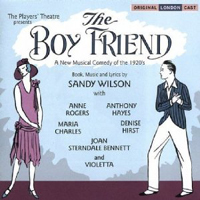 Original London Cast, 1954 (HMV/Sepia)
Original London Cast, 1954 (HMV/Sepia)  (3 / 5) A pastiche of 1920s tuners with an absurd but dear book and a Sandy Wilson score packed with wonderful tunes, The Boy Friend is presented here in a cast album of the show’s first full production. As such, this is the most “authentic” of the musical’s various recordings, but others are more complete, more fully orchestrated, and boast better singers. Many of the songs were edited down for this recording, and “Safety in Numbers” and “The ‘You-Don’t-Want-to-Play-With-Me’ Blues” are missing entirely. The performers set the tone for those who followed. Anne Rogers is Polly, the finishing-school student who falls in love with a messenger who turns out to be the son of a lord; Denise Hurst is Maisie, in love with wealthy Bobby Van Dusen; and Maria Charles is Dulcie, who has a flirtation with Lord Brockhurst. The plot comes to what is described as an ending “in which everybody is successfully paired off in a matter of minutes.” — David Wolf
(3 / 5) A pastiche of 1920s tuners with an absurd but dear book and a Sandy Wilson score packed with wonderful tunes, The Boy Friend is presented here in a cast album of the show’s first full production. As such, this is the most “authentic” of the musical’s various recordings, but others are more complete, more fully orchestrated, and boast better singers. Many of the songs were edited down for this recording, and “Safety in Numbers” and “The ‘You-Don’t-Want-to-Play-With-Me’ Blues” are missing entirely. The performers set the tone for those who followed. Anne Rogers is Polly, the finishing-school student who falls in love with a messenger who turns out to be the son of a lord; Denise Hurst is Maisie, in love with wealthy Bobby Van Dusen; and Maria Charles is Dulcie, who has a flirtation with Lord Brockhurst. The plot comes to what is described as an ending “in which everybody is successfully paired off in a matter of minutes.” — David Wolf
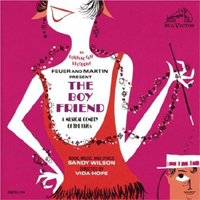 Original Broadway Cast, 1954 (RCA)
Original Broadway Cast, 1954 (RCA)  (4 / 5) When top-flight Broadway producers Cy Feuer and Ernest Martin got the American rights to The Boy Friend, they agreed to bring author Sandy Wilson and director Vida Hope to New York to ensure that the U.S. edition would be faithful to the London original. But the plan soon soured. According to Feuer’s autobiography, Wilson and Hope insisted on adding a new scene and song, which the producers vetoed. Wilson’s version of the story is that Feuer and Martin cut a song, switched actors from one role to another, and fired others. He claims they even tried to get rid of star Julie Andrews, whereas Feuer writes that he knew she was a genius all along. From all reports, the New York production was faster, louder, and broader than the original. In the only change that Wilson approved, the music was re-orchestrated (by Ted Royal and Charles L. Cooke), and more musicians were added. The Broadway cast performs with punch and precision, and the score sounds great on this recording — especially the snazzy new overture, which rides to a dazzling conclusion. — D.W.
(4 / 5) When top-flight Broadway producers Cy Feuer and Ernest Martin got the American rights to The Boy Friend, they agreed to bring author Sandy Wilson and director Vida Hope to New York to ensure that the U.S. edition would be faithful to the London original. But the plan soon soured. According to Feuer’s autobiography, Wilson and Hope insisted on adding a new scene and song, which the producers vetoed. Wilson’s version of the story is that Feuer and Martin cut a song, switched actors from one role to another, and fired others. He claims they even tried to get rid of star Julie Andrews, whereas Feuer writes that he knew she was a genius all along. From all reports, the New York production was faster, louder, and broader than the original. In the only change that Wilson approved, the music was re-orchestrated (by Ted Royal and Charles L. Cooke), and more musicians were added. The Broadway cast performs with punch and precision, and the score sounds great on this recording — especially the snazzy new overture, which rides to a dazzling conclusion. — D.W.
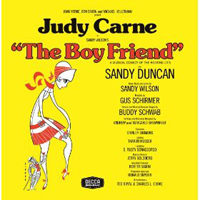 Broadway Revival Cast, 1970 (Decca)
Broadway Revival Cast, 1970 (Decca)  (4 / 5) The original Broadway production of The Boy Friend ran 485 performances, beginning in 1954. Three years later, the show was revived Off-Broadway and ran nearly twice as long. In 1970, it was revived again, this time on Broadway, and although the run was short, that production yielded a cast album that includes the Act II finale and other previously unrecorded numbers. Judy Carne, then a star of TV’s Laugh-In, got above-the-title solo billing but proved uninteresting onstage; while she sings well enough as Polly, she can’t compare with Julie Andrews or Anne Rogers. People who remember this production always refer to it as “the Sandy Duncan Boy Friend.” Indeed, Duncan was adorable in the secondary role of Maisie and got all the reviews (with her charming partner, Harvey Evans), but on the recording, she has some trouble with “Safety in Numbers.” Leon Shaw as Percy Browne sings his part of “Fancy Forgetting” poorly; Barbara Andres as Hortense speaks “It’s Nicer in Nice” rather than sings it; and the orchestra performs without the glorious abandon of the players on the first Broadway album. — D.W.
(4 / 5) The original Broadway production of The Boy Friend ran 485 performances, beginning in 1954. Three years later, the show was revived Off-Broadway and ran nearly twice as long. In 1970, it was revived again, this time on Broadway, and although the run was short, that production yielded a cast album that includes the Act II finale and other previously unrecorded numbers. Judy Carne, then a star of TV’s Laugh-In, got above-the-title solo billing but proved uninteresting onstage; while she sings well enough as Polly, she can’t compare with Julie Andrews or Anne Rogers. People who remember this production always refer to it as “the Sandy Duncan Boy Friend.” Indeed, Duncan was adorable in the secondary role of Maisie and got all the reviews (with her charming partner, Harvey Evans), but on the recording, she has some trouble with “Safety in Numbers.” Leon Shaw as Percy Browne sings his part of “Fancy Forgetting” poorly; Barbara Andres as Hortense speaks “It’s Nicer in Nice” rather than sings it; and the orchestra performs without the glorious abandon of the players on the first Broadway album. — D.W.
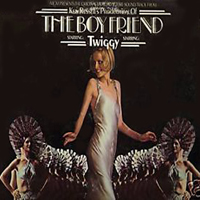 Film Soundtrack, 1971 (MGM/no CD)
Film Soundtrack, 1971 (MGM/no CD)  (1 / 5) MGM had long owned the film rights to The Boy Friend but did nothing with them until the studio took the lunatic step of handing the property to director Ken Russell. His screenplay has a repertory troupe visited by a Hollywood director who turns the troupes show The Boy Friend into a lavish movie musical. The film is filled with striking images, yet it’s campy and witless. We’re left with the charming performances of Twiggy and a young Tommy Tune. The score, here marred by too-cute orchestrations by Peter Maxwell Davies, has little feel of the ’20s. Two songs, “The ‘You-Don’t-Want-to-Play-With-Me’ Blues” and “It’s Nicer in Nice,” were cut from the film but are on the soundtrack album. Meanwhile, two vintage non-Sandy Wilson numbers, “You Are My Lucky Star” and “All I Do Is Dream of You,” were added; their interpolation can only be described as unnecessary, which is also a good word for this recording. — D.W.
(1 / 5) MGM had long owned the film rights to The Boy Friend but did nothing with them until the studio took the lunatic step of handing the property to director Ken Russell. His screenplay has a repertory troupe visited by a Hollywood director who turns the troupes show The Boy Friend into a lavish movie musical. The film is filled with striking images, yet it’s campy and witless. We’re left with the charming performances of Twiggy and a young Tommy Tune. The score, here marred by too-cute orchestrations by Peter Maxwell Davies, has little feel of the ’20s. Two songs, “The ‘You-Don’t-Want-to-Play-With-Me’ Blues” and “It’s Nicer in Nice,” were cut from the film but are on the soundtrack album. Meanwhile, two vintage non-Sandy Wilson numbers, “You Are My Lucky Star” and “All I Do Is Dream of You,” were added; their interpolation can only be described as unnecessary, which is also a good word for this recording. — D.W.
Blues in the Night
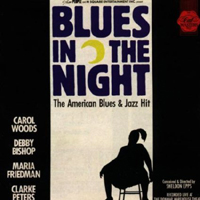 London Cast, 1987 (First Night)
London Cast, 1987 (First Night)  (4 / 5) This live recording of the revue Blues in the Night is a real gem. Arrangements that split the difference between jazz and theater combine with fetching performances of familiar and less well-known material by a variety of composers and lyricists to tell the story of three women (played by Carol Woods, Maria Friedman, and Debbie Bishop) who are in love with the same rotten guy (Clarke Peters). A rowdy, appreciative audience adds to the atmosphere and fun. Each of these gifted ladies gets a shining personality number: Woods does “Take Me for a Buggy Ride,” Friedman nails “Taking a Chance on Love,” and Bishop describes her “Rough and Ready Man.” Peters is most enjoyable in “Baby Doll.” The women make a sassy trio in “Take It Right Back,” and the ballads are also done full justice: Woods’ well-acted “Lover Man,” Friedman’s thoughtful “Willow Weep for Me,” and the group’s sweet rendition of “It Makes My Love Come Down.” In fact, several of the group numbers are home runs, among them haunting performances of “Blues in the Night” and “Nobody Knows You When You’re Down and Out.” Within the theatrical sub-genre of 1980s and 1990s revues crafted along similar lines (Sophisticated Ladies, Five Guys Named Moe, Black and Blue) this one is a personal favorite. [Note: A previous version of the show played briefly in New York in 1982 with Jean Du Shon, Debbie Shapiro (Gravitte), Leslie Uggams, and Charles Coleman in the cast, but that production yielded no cast album.] — Morgan Sills
(4 / 5) This live recording of the revue Blues in the Night is a real gem. Arrangements that split the difference between jazz and theater combine with fetching performances of familiar and less well-known material by a variety of composers and lyricists to tell the story of three women (played by Carol Woods, Maria Friedman, and Debbie Bishop) who are in love with the same rotten guy (Clarke Peters). A rowdy, appreciative audience adds to the atmosphere and fun. Each of these gifted ladies gets a shining personality number: Woods does “Take Me for a Buggy Ride,” Friedman nails “Taking a Chance on Love,” and Bishop describes her “Rough and Ready Man.” Peters is most enjoyable in “Baby Doll.” The women make a sassy trio in “Take It Right Back,” and the ballads are also done full justice: Woods’ well-acted “Lover Man,” Friedman’s thoughtful “Willow Weep for Me,” and the group’s sweet rendition of “It Makes My Love Come Down.” In fact, several of the group numbers are home runs, among them haunting performances of “Blues in the Night” and “Nobody Knows You When You’re Down and Out.” Within the theatrical sub-genre of 1980s and 1990s revues crafted along similar lines (Sophisticated Ladies, Five Guys Named Moe, Black and Blue) this one is a personal favorite. [Note: A previous version of the show played briefly in New York in 1982 with Jean Du Shon, Debbie Shapiro (Gravitte), Leslie Uggams, and Charles Coleman in the cast, but that production yielded no cast album.] — Morgan Sills
Bloomer Girl
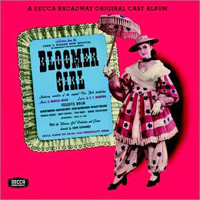 Original Broadway Cast, 1944 (Decca)
Original Broadway Cast, 1944 (Decca)  (3 / 5) While the show threw off no enduring hit songs, and is seldom revived, the cast album of this Harold Arlen-E.Y. Harburg wartime hit has rarely been out of print. Inspired by the life of feminist/industrialist Dolly Bloomer — although the bloomer girl of the title is her fictional niece, Evelina — and set during the Civil War, its score has long melodic lines and blues-tinged harmonies, subtle satire, and loads of Harburgian wordplay. As he often did, the master lyricist pokes fun at the battle of the sexes, skewers moral hypocrisy (Evelina lives in a community so staid that “Even the rabbits / Inhibit their habits”), and argues stirringly for the cause of freedom in the stunning song “The Eagle and Me.” (It’s one of the 50 songs that Stephen Sondheim has stated he wishes he’d written, and you’ll understand why.) Bloomer Girl was one of the first of the post-Oklahoma! Americana musicals, and it borrowed that show’s personnel liberally — not just choreographer Agnes De Mille, but also soubrettes Joan McCracken and Celeste Holm, the latter promoted to leading lady. Truth to tell, Holm is vocally underpowered for Evelina, falling back on scoops, head voice, and other tricks to make it through such rangy Arlen melodies as “Right as the Rain.” McCracken is even worse, so overplaying her comedy songs that she nearly spoils such choice couplets as “Utopia, Utopia / Don’t be a dope, ya dope, ya!” The men aren’t vocal godsends, either: David Brooks’ “Evelina” and Dooley Wilson’s “The Eagle and Me” lack flavor. The most powerful singer on the album is probably Arlen himself, making an impressive cameo appearance in “Man for Sale.” As to the album’s various issues and reissues, the Decca CD is the keeper; a simulated stereo LP edition made everyone sound like they were singing at the bottom of a well. This version is sonically improved and has some dandy extras, such as a longer, funnier version of “Sunday in Cicero Falls” and an alternate take of “I Got a Song.” — Marc Miller
(3 / 5) While the show threw off no enduring hit songs, and is seldom revived, the cast album of this Harold Arlen-E.Y. Harburg wartime hit has rarely been out of print. Inspired by the life of feminist/industrialist Dolly Bloomer — although the bloomer girl of the title is her fictional niece, Evelina — and set during the Civil War, its score has long melodic lines and blues-tinged harmonies, subtle satire, and loads of Harburgian wordplay. As he often did, the master lyricist pokes fun at the battle of the sexes, skewers moral hypocrisy (Evelina lives in a community so staid that “Even the rabbits / Inhibit their habits”), and argues stirringly for the cause of freedom in the stunning song “The Eagle and Me.” (It’s one of the 50 songs that Stephen Sondheim has stated he wishes he’d written, and you’ll understand why.) Bloomer Girl was one of the first of the post-Oklahoma! Americana musicals, and it borrowed that show’s personnel liberally — not just choreographer Agnes De Mille, but also soubrettes Joan McCracken and Celeste Holm, the latter promoted to leading lady. Truth to tell, Holm is vocally underpowered for Evelina, falling back on scoops, head voice, and other tricks to make it through such rangy Arlen melodies as “Right as the Rain.” McCracken is even worse, so overplaying her comedy songs that she nearly spoils such choice couplets as “Utopia, Utopia / Don’t be a dope, ya dope, ya!” The men aren’t vocal godsends, either: David Brooks’ “Evelina” and Dooley Wilson’s “The Eagle and Me” lack flavor. The most powerful singer on the album is probably Arlen himself, making an impressive cameo appearance in “Man for Sale.” As to the album’s various issues and reissues, the Decca CD is the keeper; a simulated stereo LP edition made everyone sound like they were singing at the bottom of a well. This version is sonically improved and has some dandy extras, such as a longer, funnier version of “Sunday in Cicero Falls” and an alternate take of “I Got a Song.” — Marc Miller
Blood Brothers
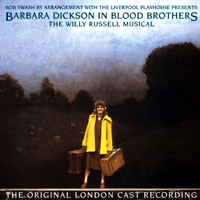 Original London Cast, 1983 (Castle)
Original London Cast, 1983 (Castle)  (2 / 5) This is the story of Mrs. Johnstone, a lower-class Liverpudlian whose husband deserts her, even though she’s pregnant and already has seven children. Mrs. J., having determined that she can afford to care and provide for only one more child, is devastated to learn that she’ll be giving birth to twins. In desperation, she agrees to let her rich employer, Mrs. Lyons, take one of the babies to raise as her own. At age seven, the two non-identical twin boys — Mrs. J’s Mickey and Mrs. L’s Eddie — improbably meet and become fast friends, unaware that they are siblings. Years later, this melodramatic situation leads to tragedy, explicated in ominous tones by a Narrator. It’s easy to make fun of Blood Brothers, and indeed, it inspired a hilarious Forbidden Broadway spoof. With book, music, and lyrics by Willy Russell, the show is very earnest, but it leaves much to be desired in terms of professional polish. Some of the lyrics don’t quite fit the music, and there are several imperfect rhymes (“chap/chat”) along with some neat, clever ones (“soldier/told yer”). In the first version of a song titled “Marilyn Monroe,” most of the references to that screen goddess are apt, but they become strained to the point of ridiculousness in subsequent numbers. On the whole, Russell’s music is better than his lyrics; the melodies of “Sunday Afternoon,” “Easy Terms,” and “Tell Me It’s Not True” are haunting, while “Bright New Day” is joyous. Some melodies and themes recur with added impact, as when the tune of “My Child,” sung early on by the two mothers, is later used for “My Friend,” the twins’ declaration of their instinctive bond. Other recurring melodies and/or lyrics are simply annoying, as for example the seemingly endless repetitions of the phrase “You know the devil’s got your number.” The strong cast of the first recording is led by Barbara Dickson as Mrs. Johnstone, George Costigan as Mickey, Andrew C. Wadsworth as Eddie, and Andrew Schofield as the Narrator, but the score’s virtues are undermined by keyboard-and-synthesizer-heavy arrangements. — Michael Portantiere
(2 / 5) This is the story of Mrs. Johnstone, a lower-class Liverpudlian whose husband deserts her, even though she’s pregnant and already has seven children. Mrs. J., having determined that she can afford to care and provide for only one more child, is devastated to learn that she’ll be giving birth to twins. In desperation, she agrees to let her rich employer, Mrs. Lyons, take one of the babies to raise as her own. At age seven, the two non-identical twin boys — Mrs. J’s Mickey and Mrs. L’s Eddie — improbably meet and become fast friends, unaware that they are siblings. Years later, this melodramatic situation leads to tragedy, explicated in ominous tones by a Narrator. It’s easy to make fun of Blood Brothers, and indeed, it inspired a hilarious Forbidden Broadway spoof. With book, music, and lyrics by Willy Russell, the show is very earnest, but it leaves much to be desired in terms of professional polish. Some of the lyrics don’t quite fit the music, and there are several imperfect rhymes (“chap/chat”) along with some neat, clever ones (“soldier/told yer”). In the first version of a song titled “Marilyn Monroe,” most of the references to that screen goddess are apt, but they become strained to the point of ridiculousness in subsequent numbers. On the whole, Russell’s music is better than his lyrics; the melodies of “Sunday Afternoon,” “Easy Terms,” and “Tell Me It’s Not True” are haunting, while “Bright New Day” is joyous. Some melodies and themes recur with added impact, as when the tune of “My Child,” sung early on by the two mothers, is later used for “My Friend,” the twins’ declaration of their instinctive bond. Other recurring melodies and/or lyrics are simply annoying, as for example the seemingly endless repetitions of the phrase “You know the devil’s got your number.” The strong cast of the first recording is led by Barbara Dickson as Mrs. Johnstone, George Costigan as Mickey, Andrew C. Wadsworth as Eddie, and Andrew Schofield as the Narrator, but the score’s virtues are undermined by keyboard-and-synthesizer-heavy arrangements. — Michael Portantiere
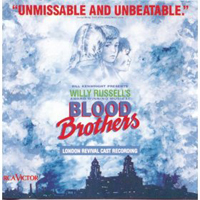 London Cast, 1988 (RCA)
London Cast, 1988 (RCA)  (3 / 5) This recording is superior to its predecessor, offering better arrangements/orchestrations and more music — about 15 minutes’ worth. Oddly, the song originally called “The Devil’s Got Your Number” is now called “Shoes Upon the Table.” Other titles have changed as well. Kiki Dee, best known as a Brit-pop singer and sometime musical partner of Elton John, is very good as Mrs. Johnstone. So is Robert Locke in the role of Eddie. And Con O’Neill is the best Mickey in all the recordings under review, bringing to the character a wonderfully winning innocence in the childhood stage and a moving angst as an adult. Also praiseworthy is Warwick Evans as the Narrator. (Both O’Neill and Evans would go on to play these roles in the 1993 Broadway production of Blood Brothers, which did not yield a cast recording.) — M.P.
(3 / 5) This recording is superior to its predecessor, offering better arrangements/orchestrations and more music — about 15 minutes’ worth. Oddly, the song originally called “The Devil’s Got Your Number” is now called “Shoes Upon the Table.” Other titles have changed as well. Kiki Dee, best known as a Brit-pop singer and sometime musical partner of Elton John, is very good as Mrs. Johnstone. So is Robert Locke in the role of Eddie. And Con O’Neill is the best Mickey in all the recordings under review, bringing to the character a wonderfully winning innocence in the childhood stage and a moving angst as an adult. Also praiseworthy is Warwick Evans as the Narrator. (Both O’Neill and Evans would go on to play these roles in the 1993 Broadway production of Blood Brothers, which did not yield a cast recording.) — M.P.
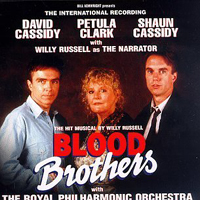 The International Recording, 1995 (First Night)
The International Recording, 1995 (First Night)  (4 / 5) Three starry leads and the Royal Philharmonic Orchestra will make this the preferred Blood Brothers recording for many listeners. At over an hour in length, it’s also the most complete of the recordings under review. The singers and the huge orchestra are recorded in a weighty, reverberant acoustic that makes the score seem lush and important or somewhat heavy and pretentious, depending on one’s taste; the overture here is a far cry from the synthesized sound of the one on the first Blood Brothers cast album. As for the famous lead singers, it’s a pleasure to report that all three are excellent. Petula Clark, a major pop star of the 1960s with impressive stage and film credits as well, has a compelling, soulful voice that’s perfect for Mrs. Johnstone. The erstwhile American teen idols David and Sean Cassidy, half-brothers in real life, sing very well as Mickey and Eddie, and their Brit accents are quite convincing. The Narrator here is Willy Russell, who wrote the show’s book, music, and lyrics. — M.P.
(4 / 5) Three starry leads and the Royal Philharmonic Orchestra will make this the preferred Blood Brothers recording for many listeners. At over an hour in length, it’s also the most complete of the recordings under review. The singers and the huge orchestra are recorded in a weighty, reverberant acoustic that makes the score seem lush and important or somewhat heavy and pretentious, depending on one’s taste; the overture here is a far cry from the synthesized sound of the one on the first Blood Brothers cast album. As for the famous lead singers, it’s a pleasure to report that all three are excellent. Petula Clark, a major pop star of the 1960s with impressive stage and film credits as well, has a compelling, soulful voice that’s perfect for Mrs. Johnstone. The erstwhile American teen idols David and Sean Cassidy, half-brothers in real life, sing very well as Mickey and Eddie, and their Brit accents are quite convincing. The Narrator here is Willy Russell, who wrote the show’s book, music, and lyrics. — M.P.
 London Cast, 1995 (First Night)
London Cast, 1995 (First Night)  (3 / 5) This recording is worth tracking down primarily for the superb singing and acting of Stephanie Lawrence, who had previously played Mrs. Johnstone on Broadway in 1993. Here heading a fine cast that also includes Paul Crosby as Mickey and Joanna Monro as Mrs. Lyons, with Warwick Evans back as the Narrator, Lawrence is in a class by herself as Mrs. J. The fact that she died at age 50, about five years after this recording, only increases the value of the album as a memento of her heartbreaking performance, so deeply committed that it even makes the most purple passages of the score seem moving rather than silly. Another big plus is the endearing Eddie of Mark Hutchinson, who had also been a member of the first Broadway cast of the show; his rendition of the sweet pop ballad “I’m Not Saying a Word” is particularly enjoyable. — M.P.
(3 / 5) This recording is worth tracking down primarily for the superb singing and acting of Stephanie Lawrence, who had previously played Mrs. Johnstone on Broadway in 1993. Here heading a fine cast that also includes Paul Crosby as Mickey and Joanna Monro as Mrs. Lyons, with Warwick Evans back as the Narrator, Lawrence is in a class by herself as Mrs. J. The fact that she died at age 50, about five years after this recording, only increases the value of the album as a memento of her heartbreaking performance, so deeply committed that it even makes the most purple passages of the score seem moving rather than silly. Another big plus is the endearing Eddie of Mark Hutchinson, who had also been a member of the first Broadway cast of the show; his rendition of the sweet pop ballad “I’m Not Saying a Word” is particularly enjoyable. — M.P.
Black and Blue
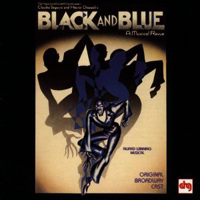 Original Broadway Cast, 1989 (DRG)
Original Broadway Cast, 1989 (DRG)  (4 / 5) The title of this show, taken from a Fats Waller song, pretty much announces what it will be: Another revue-style look at African-American entertainment in the first half of the 20th century, this time emphasizing the music of such great blues women as Bessie Smith and Ma Rainey. Interestingly, the show was created by Argentineans (Claudio Segovia and Hector Orezzoli) living in France, reminding us that some aspects of American culture are more appreciated by so-called outsiders. It’s not easy to feel the shape of the show from this disc, and it’s a pity that the three leads had to share the stage and recording studio with less charismatic performers. Still, most of the songs are delivered by a powerful star trio. In the opening number, Ruth Brown, Linda Hopkins, and Carrie Smith announce, “I’m a Woman.” The Tony Award-winning Brown has the roughest voice and rawest style. Smith lends a smoother tone to such standards as “Am I Blue?” and Hopkins channels her enormous voice compellingly. While there is no clear-cut winner among the three, Brown’s wry double entendres in “If I Can’t Sell It, I’ll Keep Sittin’ on It” rate special mention. As long as this recording focuses on the stars and their first-rate instrumental support, it’s boisterous, funny, and frequently moving. — Richard Barrios
(4 / 5) The title of this show, taken from a Fats Waller song, pretty much announces what it will be: Another revue-style look at African-American entertainment in the first half of the 20th century, this time emphasizing the music of such great blues women as Bessie Smith and Ma Rainey. Interestingly, the show was created by Argentineans (Claudio Segovia and Hector Orezzoli) living in France, reminding us that some aspects of American culture are more appreciated by so-called outsiders. It’s not easy to feel the shape of the show from this disc, and it’s a pity that the three leads had to share the stage and recording studio with less charismatic performers. Still, most of the songs are delivered by a powerful star trio. In the opening number, Ruth Brown, Linda Hopkins, and Carrie Smith announce, “I’m a Woman.” The Tony Award-winning Brown has the roughest voice and rawest style. Smith lends a smoother tone to such standards as “Am I Blue?” and Hopkins channels her enormous voice compellingly. While there is no clear-cut winner among the three, Brown’s wry double entendres in “If I Can’t Sell It, I’ll Keep Sittin’ on It” rate special mention. As long as this recording focuses on the stars and their first-rate instrumental support, it’s boisterous, funny, and frequently moving. — Richard Barrios
Bitter Sweet
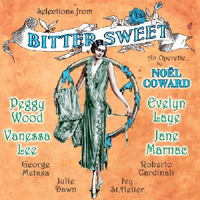 Studio Cast, 1960 (Angel/Sepia)
Studio Cast, 1960 (Angel/Sepia)  (1 / 5) It seemed a radical idea in 1929: an operetta with believable characters, literate dialogue, first-rate lyrics, and a minimum of the coyness associated with the form. With Noël Coward providing all of the above, plus the music, a classic was born — a sentimental love story with grace, intelligence, wit, and irony. Alas, the recording industry has yet to do the show full justice. Aside from a few tracks featuring the original London cast (including Peggy Wood, whose “Zigeuner” sounds like a madwoman’s hysterics), Bitter Sweet has rated only two studio cast recordings and one stage revival cast album. The first studio effort is this atrocity, issued in over-emphatic early stereo and clocking in at a modest but by no means brisk 40 minutes. Are the singers at fault? Not really. Vanessa Lee’s Sarah has spirit and excellent top notes, while Roberto Cardinali’s sturdy tenor lends romantic presence in the role of Carl. On the other hand, Julie Dawn’s Manon — who sings “If Love Were All” and “Kiss Me” — is a sexy French kitten, not the world-weary chanteuse so superbly embodied by Ivy St. Helier in the original. But don’t blame Dawn or even Michael Collins’ turgid conducting; blame the orchestrations, by Brian Fahey and Ray Terry. Overwhelmed by violins, they spread a thick, maple sugar glaze over Coward’s delicate story. The Sepia CD compilation is far more interesting for its inclusion of the few recordings by the original cast. — Marc Miller
(1 / 5) It seemed a radical idea in 1929: an operetta with believable characters, literate dialogue, first-rate lyrics, and a minimum of the coyness associated with the form. With Noël Coward providing all of the above, plus the music, a classic was born — a sentimental love story with grace, intelligence, wit, and irony. Alas, the recording industry has yet to do the show full justice. Aside from a few tracks featuring the original London cast (including Peggy Wood, whose “Zigeuner” sounds like a madwoman’s hysterics), Bitter Sweet has rated only two studio cast recordings and one stage revival cast album. The first studio effort is this atrocity, issued in over-emphatic early stereo and clocking in at a modest but by no means brisk 40 minutes. Are the singers at fault? Not really. Vanessa Lee’s Sarah has spirit and excellent top notes, while Roberto Cardinali’s sturdy tenor lends romantic presence in the role of Carl. On the other hand, Julie Dawn’s Manon — who sings “If Love Were All” and “Kiss Me” — is a sexy French kitten, not the world-weary chanteuse so superbly embodied by Ivy St. Helier in the original. But don’t blame Dawn or even Michael Collins’ turgid conducting; blame the orchestrations, by Brian Fahey and Ray Terry. Overwhelmed by violins, they spread a thick, maple sugar glaze over Coward’s delicate story. The Sepia CD compilation is far more interesting for its inclusion of the few recordings by the original cast. — Marc Miller
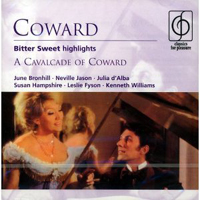 Studio Cast, 1969 (EMI)
Studio Cast, 1969 (EMI)  (2 / 5) If the preceding album represents operetta performance at its most clueless, this entry isn’t far behind. Johnny Douglas’ orchestrations are a step above the primordial soup of the earlier set, but they proceed from the same premise: Disguise an operetta’s age by pretending it’s a 1960s musical, loading it up with too many strings, too many brass flourishes, and even jazz-combo drums (at the end of “Ladies of the Town”). The conducting is glacial, especially in the waltzes: “Kiss Me” is a dirge. But this disc does have a superior set of singers. The great Australian operetta soprano June Bronhill sings quite lusciously, trilling an audacious high C at the end of “What Is Love?” Opposite her, Neville Jason has more personality than most Carls. Julia D’Alba’s Manon is another purring feline, but her throaty alto is pleasant to hear. The meaningless finale, which miraculously brings Carl back from the dead to duet with Sarah on “I’ll See You Again,” is a miscalculation. Nevertheless, some of Coward’s material shines through the mishandling on this well-engineered album, like the sun through a British cloud cover. — M.M.
(2 / 5) If the preceding album represents operetta performance at its most clueless, this entry isn’t far behind. Johnny Douglas’ orchestrations are a step above the primordial soup of the earlier set, but they proceed from the same premise: Disguise an operetta’s age by pretending it’s a 1960s musical, loading it up with too many strings, too many brass flourishes, and even jazz-combo drums (at the end of “Ladies of the Town”). The conducting is glacial, especially in the waltzes: “Kiss Me” is a dirge. But this disc does have a superior set of singers. The great Australian operetta soprano June Bronhill sings quite lusciously, trilling an audacious high C at the end of “What Is Love?” Opposite her, Neville Jason has more personality than most Carls. Julia D’Alba’s Manon is another purring feline, but her throaty alto is pleasant to hear. The meaningless finale, which miraculously brings Carl back from the dead to duet with Sarah on “I’ll See You Again,” is a miscalculation. Nevertheless, some of Coward’s material shines through the mishandling on this well-engineered album, like the sun through a British cloud cover. — M.M.
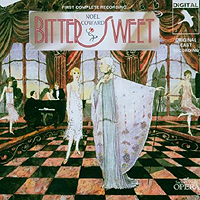 Sadler’s Wells Cast, 1988 (JAY, 2CDs)
Sadler’s Wells Cast, 1988 (JAY, 2CDs)  (3 / 5) Now, this is more like it. The excellent Sadler’s Wells light opera company aimed for a complete Bitter Sweet, true to the spirit of Coward and definitive in its musical presentation. This is by far the most complete recording of the score: It lacks only an overture, a couple of incidental songs, and some underscoring. Finally, we get to hear all of Coward’s unflinching lyrics to “Green Carnation” and “Alas, the Time Is Past.” There’s also an entrancing, instrumental-only “Bitter Sweet Waltz”; its flatted thirds show Coward to be a more adventurous composer at age 29 than many realized. But Bitter Sweet needs inspired casting to catch fire, and this is merely a pretty good operetta ensemble. Valerie Masterson is a no-nonsense Sarah, vocally secure and suitably warm — yet the character is supposed to metamorphose from a willful romantic to a wise grande dame, and the singer doesn’t differentiate much between the two. As Carl, Martin Smith has scant personality and not enough voice. Rosemary Ashe is a capable Manon, up to the demands of “If Love Were All” and the saucy “Bonne Nuit, Merci,” but she’s not distinctive. The orchestrations aren’t the originals, and there’s a blandness to them, as there is to Michael Reed’s conducting. Transitional dialogue is included in over-perky line readings that never convey how much smarter Bitter Sweet is than the average operetta. The lavish, dual-CD packaging promises something special, but what’s really special about the album is Sir Noël’s material, not this hit-or-miss rendition of it. — M.M.
(3 / 5) Now, this is more like it. The excellent Sadler’s Wells light opera company aimed for a complete Bitter Sweet, true to the spirit of Coward and definitive in its musical presentation. This is by far the most complete recording of the score: It lacks only an overture, a couple of incidental songs, and some underscoring. Finally, we get to hear all of Coward’s unflinching lyrics to “Green Carnation” and “Alas, the Time Is Past.” There’s also an entrancing, instrumental-only “Bitter Sweet Waltz”; its flatted thirds show Coward to be a more adventurous composer at age 29 than many realized. But Bitter Sweet needs inspired casting to catch fire, and this is merely a pretty good operetta ensemble. Valerie Masterson is a no-nonsense Sarah, vocally secure and suitably warm — yet the character is supposed to metamorphose from a willful romantic to a wise grande dame, and the singer doesn’t differentiate much between the two. As Carl, Martin Smith has scant personality and not enough voice. Rosemary Ashe is a capable Manon, up to the demands of “If Love Were All” and the saucy “Bonne Nuit, Merci,” but she’s not distinctive. The orchestrations aren’t the originals, and there’s a blandness to them, as there is to Michael Reed’s conducting. Transitional dialogue is included in over-perky line readings that never convey how much smarter Bitter Sweet is than the average operetta. The lavish, dual-CD packaging promises something special, but what’s really special about the album is Sir Noël’s material, not this hit-or-miss rendition of it. — M.M.
Birds of Paradise
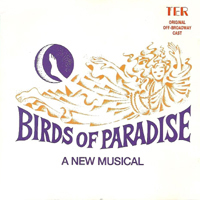 Original Off-Broadway Cast, 1987 (JAY)
Original Off-Broadway Cast, 1987 (JAY)  (4 / 5) On hearing this recording, listeners are bound to wonder why the show was not more successful. The score is filled with intricate, catchy melodies by David Evans and intelligent, witty lyrics by Winnie Holtzman. From start to finish, the performers sing and act as if they have discovered a pot of gold. The opening number, “Too Many Nights,” cleverly introduces actors in a community theater awaiting the arrival of someone who’s coming to direct them in a new musical. Two other highlights are Todd Graff’s duet with Crista Moore in the exciting “Coming True,” and Donna Murphy, Mary Beth Peil, and Barbara Walsh joining their powerhouse voices in the title song. When Graff and Peil confront each other in “After Opening Night,” it’s engrossing and moving. Some of the comedic numbers may not work very well outside of the show’s context, but John Cunningham’s “Somebody,” J. K. Simmons’ “She’s Out There,” and Peil’s “You’re Mine” are among the other fine songs in this top-notch score. Also worthy of note is the lovely ballad “Imagining You.” The show was directed by Arthur Laurents, and it seems clear that he encouraged the writers to spread their wings. This album is altogether necessary for discriminating enthusiasts. — Jeffrey Dunn
(4 / 5) On hearing this recording, listeners are bound to wonder why the show was not more successful. The score is filled with intricate, catchy melodies by David Evans and intelligent, witty lyrics by Winnie Holtzman. From start to finish, the performers sing and act as if they have discovered a pot of gold. The opening number, “Too Many Nights,” cleverly introduces actors in a community theater awaiting the arrival of someone who’s coming to direct them in a new musical. Two other highlights are Todd Graff’s duet with Crista Moore in the exciting “Coming True,” and Donna Murphy, Mary Beth Peil, and Barbara Walsh joining their powerhouse voices in the title song. When Graff and Peil confront each other in “After Opening Night,” it’s engrossing and moving. Some of the comedic numbers may not work very well outside of the show’s context, but John Cunningham’s “Somebody,” J. K. Simmons’ “She’s Out There,” and Peil’s “You’re Mine” are among the other fine songs in this top-notch score. Also worthy of note is the lovely ballad “Imagining You.” The show was directed by Arthur Laurents, and it seems clear that he encouraged the writers to spread their wings. This album is altogether necessary for discriminating enthusiasts. — Jeffrey Dunn
Billy Noname
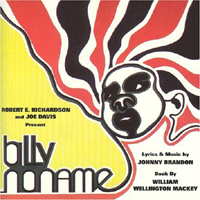 Original Off-Broadway Cast, 1970 (Roulette/Original Cast Records)
Original Off-Broadway Cast, 1970 (Roulette/Original Cast Records)  (2 / 5) An interesting autobiography of a fictional black playwright who is frequently angry and sometimes simply yearning, this musical covers his life from conception (in a street rape) through World War II, the civil rights movement, and the death of Martin Luther King (the final song is titled “Burn, Baby, Burn!”). The playwright ponders his role in the struggles of his era, but the ending of the show offers no answers. Of course, it’s impossible to know from the cast album how detailed and skillful William Wellington Mackey’s script is. The songs, by Johnny Brandon, travel confidently through the story’s 30 years, moving easily along with swing, rhythm and blues, early rock, and the sounds of the late 1960s. Although there’s not a lot of dramatic musical writing here, the tunes are mostly vibrant and rhythmic and it’s certainly easy to accept them as the language of these characters. The title role is uncommonly well sung by Donny Burks, and there are fine supporting performances by Alan Weeks, Hattie Winston, and Urylee Leonardos. — David Wolf
(2 / 5) An interesting autobiography of a fictional black playwright who is frequently angry and sometimes simply yearning, this musical covers his life from conception (in a street rape) through World War II, the civil rights movement, and the death of Martin Luther King (the final song is titled “Burn, Baby, Burn!”). The playwright ponders his role in the struggles of his era, but the ending of the show offers no answers. Of course, it’s impossible to know from the cast album how detailed and skillful William Wellington Mackey’s script is. The songs, by Johnny Brandon, travel confidently through the story’s 30 years, moving easily along with swing, rhythm and blues, early rock, and the sounds of the late 1960s. Although there’s not a lot of dramatic musical writing here, the tunes are mostly vibrant and rhythmic and it’s certainly easy to accept them as the language of these characters. The title role is uncommonly well sung by Donny Burks, and there are fine supporting performances by Alan Weeks, Hattie Winston, and Urylee Leonardos. — David Wolf
Billion Dollar Baby
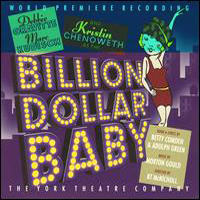 World Premiere Recording, 2000 (Original Cast Records)
World Premiere Recording, 2000 (Original Cast Records)  (1 / 5) Betty Comden and Adolph Green followed On the Town with this disappointment, a satire of the 1920s. Except for a dance sequence that appeared in Jerome Robbins’ Broadway, the 1945 show was largely forgotten until a staged concert performance at the York Theatre led to this recording. In the title role, Kristin Chenoweth chisels her way to the top, going from failed beauty-contest entrant to gangster’s moll and landing a billionaire just as the stock market crashes. Among her victims are Debbie Gravitte as a Texas Guinan-like nightclub owner, Marc Kudisch as a mob figure, and Richard B. Shull as the bank account of her dreams. In general, Morton Gould’s score lacks distinction, and the many dance interludes have been condensed in James Bassi’s four-piece orchestrations. The celebrated Comden and Green wit isn’t always in evidence, but Gravitte gets the best numbers — “Broadway Blossom” and “Havin’ a Time” — and Kudisch delivers a jazzy item called “Bad Timing.” Considering that she has the title role, Chenoweth has relatively little to do (the part was written for dancer Joan McCracken), and her numbers, including “Dreams Come True” and “Faithless,” are forgettable. Still, even if this show is no lost classic, fans of the cast members and of Comden and Green will want to give the CD a spin. — David Barbour
(1 / 5) Betty Comden and Adolph Green followed On the Town with this disappointment, a satire of the 1920s. Except for a dance sequence that appeared in Jerome Robbins’ Broadway, the 1945 show was largely forgotten until a staged concert performance at the York Theatre led to this recording. In the title role, Kristin Chenoweth chisels her way to the top, going from failed beauty-contest entrant to gangster’s moll and landing a billionaire just as the stock market crashes. Among her victims are Debbie Gravitte as a Texas Guinan-like nightclub owner, Marc Kudisch as a mob figure, and Richard B. Shull as the bank account of her dreams. In general, Morton Gould’s score lacks distinction, and the many dance interludes have been condensed in James Bassi’s four-piece orchestrations. The celebrated Comden and Green wit isn’t always in evidence, but Gravitte gets the best numbers — “Broadway Blossom” and “Havin’ a Time” — and Kudisch delivers a jazzy item called “Bad Timing.” Considering that she has the title role, Chenoweth has relatively little to do (the part was written for dancer Joan McCracken), and her numbers, including “Dreams Come True” and “Faithless,” are forgettable. Still, even if this show is no lost classic, fans of the cast members and of Comden and Green will want to give the CD a spin. — David Barbour
Big River
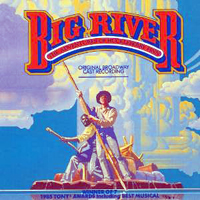 Original Broadway Cast, 1985 (MCA)
Original Broadway Cast, 1985 (MCA)  (3 / 5) Country-music songwriter Roger Miller furnished the score for this musical version of the Mark Twain classic Huckleberry Finn, and the result is a twangy Broadway sound that’s just right for the beloved tale. The rollicking “Muddy Water” and the more serene “River in the Rain” represent Miller at his best, while quirky comic numbers such as “Hand for the Hog” (Tom Sawyer’s tribute to his porcine pals) illustrate why Miller is also well known as a novelty songwriter. His skill as a tunesmith is unimpeachable here — but his lyrics, while frequently quite clever, are sometimes too simplistic or repetitive for a Broadway book musical. “Waitin’ for the Light to Shine,” for instance, may be the show’s most melodically beautiful number, but there’s little to distinguish it from any other gospel song. As far as good show-tune writing is concerned, Miller does prove himself with the lively opener “Do Ya Wanna Go to Heaven?”and the affecting “Leavin’s Not the Only Way to Go.” The finest performances on this disc are by Daniel Jenkins as Huck and Tony Award-winner Ron Richardson as his best friend, the runaway slave Jim. And a pre-Roseanne John Goodman does a memorable turn as Huck’s crazy father, Pap, railing comically against the “Guv’ment.” — Brooke Pierce
(3 / 5) Country-music songwriter Roger Miller furnished the score for this musical version of the Mark Twain classic Huckleberry Finn, and the result is a twangy Broadway sound that’s just right for the beloved tale. The rollicking “Muddy Water” and the more serene “River in the Rain” represent Miller at his best, while quirky comic numbers such as “Hand for the Hog” (Tom Sawyer’s tribute to his porcine pals) illustrate why Miller is also well known as a novelty songwriter. His skill as a tunesmith is unimpeachable here — but his lyrics, while frequently quite clever, are sometimes too simplistic or repetitive for a Broadway book musical. “Waitin’ for the Light to Shine,” for instance, may be the show’s most melodically beautiful number, but there’s little to distinguish it from any other gospel song. As far as good show-tune writing is concerned, Miller does prove himself with the lively opener “Do Ya Wanna Go to Heaven?”and the affecting “Leavin’s Not the Only Way to Go.” The finest performances on this disc are by Daniel Jenkins as Huck and Tony Award-winner Ron Richardson as his best friend, the runaway slave Jim. And a pre-Roseanne John Goodman does a memorable turn as Huck’s crazy father, Pap, railing comically against the “Guv’ment.” — Brooke Pierce
Big
 Original Broadway Cast, 1996 (Universal/Decca)
Original Broadway Cast, 1996 (Universal/Decca)  (1 / 5) Onstage, Big was a textbook example of how a top creative team with all the right intentions could destroy the charm of a beloved film. On disc, the score by Richard Maltby, Jr. and David Shire provides sporadic enjoyment, even if it’s somewhat overbearing. John Weidman’s book closely follows Gary Ross and Anne Spielberg’s screenplay: Josh (Patrick Levis) is a frustrated 12-year-old who wakes up one morning in the body of an adult (Daniel Jenkins). He runs off to New York, becomes a successful toy executive, and falls in love with a colleague named Susan (Crista Moore). The overture starts things off on an exciting note, and the opening number, “Can’t Wait,” sets the right tone of generation-gap exasperation. But the songs tend to dwell on the characters’ feelings when they’re not straining for exuberance; this is especially true of “Fun,” in which Josh kicks up a ruckus at F.A.O. Schwartz with the toy magnate MacMillan (john Cypher). The quieter numbers work best — especially “Stop, Time,” sung by Josh’s mother (Barbara Walsh), and “I Want to Know,” sung by Josh when he realizes that he’s going to spend the night with Susan. There’s also a catchy chorus number, “Cross the Line,” performed at a toy company party. But too much of the score, especially as arranged by Doug Besterman, is bombastic and full of false high spirits. — David Barbour
(1 / 5) Onstage, Big was a textbook example of how a top creative team with all the right intentions could destroy the charm of a beloved film. On disc, the score by Richard Maltby, Jr. and David Shire provides sporadic enjoyment, even if it’s somewhat overbearing. John Weidman’s book closely follows Gary Ross and Anne Spielberg’s screenplay: Josh (Patrick Levis) is a frustrated 12-year-old who wakes up one morning in the body of an adult (Daniel Jenkins). He runs off to New York, becomes a successful toy executive, and falls in love with a colleague named Susan (Crista Moore). The overture starts things off on an exciting note, and the opening number, “Can’t Wait,” sets the right tone of generation-gap exasperation. But the songs tend to dwell on the characters’ feelings when they’re not straining for exuberance; this is especially true of “Fun,” in which Josh kicks up a ruckus at F.A.O. Schwartz with the toy magnate MacMillan (john Cypher). The quieter numbers work best — especially “Stop, Time,” sung by Josh’s mother (Barbara Walsh), and “I Want to Know,” sung by Josh when he realizes that he’s going to spend the night with Susan. There’s also a catchy chorus number, “Cross the Line,” performed at a toy company party. But too much of the score, especially as arranged by Doug Besterman, is bombastic and full of false high spirits. — David Barbour
As Thousands Cheer
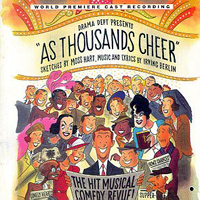 Off Broadway Cast, 1998 (Varèse Sarabande)
Off Broadway Cast, 1998 (Varèse Sarabande)  (4 / 5) At a time when large-scale revues were part of the standard traffic on Broadway, Irving Berlin’s As Thousands Cheer was a Bentley. It had great stars, terrific songs, and clever sketches, all with a specific focus: The show was a Sunday newspaper come to life, its varied components commenting on or illustrating topical stories, Hollywood gossip, comic strips, and even the weather report (“Heat Wave”). If anyone wonders about that “rotogravure” line in “Easter Parade,” this show provides an explanation. Original cast members Clifton Webb and Ethel Waters left recorded souvenirs of the show, and nothing will ever top Waters’ performances of “Harlem on My Mind” and “Heat Wave.” (She did not record the devastating “Supper Time” until years later.) The show itself remained an irretrievable legend until 1998, when a “revival” was produced Off-Broadway by the scrappy and inventive Drama Dept. Wisely, there was no attempt to reproduce the show as it was originally, or to have modern performers pretend to be Marilyn Miller or Ethel Waters. Instead, the production put Berlin’s songs and some of the show’s original sketches into one zippy act performed by a talented cast of six who constantly shifted roles. The accompaniment was piano and bass. The charm of that production is communicated by this “World Premiere Cast Recording,” as it is labeled, which reverts to the original order of the songs and generously reinstates “Easter Parade” (not heard in the actual revival). Howard McGillin, Judy Kuhn, B.D. Wong, Mary Beth Peil, Kevin Chamberlin, and Paula Newsome sing and cavort with skill and enthusiasm — and if Newsome’s “Supper Time” can’t touch the Waters version, neither can anyone else’s. There’s even an unknown Berlin gem here: “Through a Keyhole,” a moody evocation of a Walter Winchell-esque gossip reporter. The show may sound more like “As Dozens Cheer” in this version, but at least the cheers are heartfelt. — Richard Barrios
(4 / 5) At a time when large-scale revues were part of the standard traffic on Broadway, Irving Berlin’s As Thousands Cheer was a Bentley. It had great stars, terrific songs, and clever sketches, all with a specific focus: The show was a Sunday newspaper come to life, its varied components commenting on or illustrating topical stories, Hollywood gossip, comic strips, and even the weather report (“Heat Wave”). If anyone wonders about that “rotogravure” line in “Easter Parade,” this show provides an explanation. Original cast members Clifton Webb and Ethel Waters left recorded souvenirs of the show, and nothing will ever top Waters’ performances of “Harlem on My Mind” and “Heat Wave.” (She did not record the devastating “Supper Time” until years later.) The show itself remained an irretrievable legend until 1998, when a “revival” was produced Off-Broadway by the scrappy and inventive Drama Dept. Wisely, there was no attempt to reproduce the show as it was originally, or to have modern performers pretend to be Marilyn Miller or Ethel Waters. Instead, the production put Berlin’s songs and some of the show’s original sketches into one zippy act performed by a talented cast of six who constantly shifted roles. The accompaniment was piano and bass. The charm of that production is communicated by this “World Premiere Cast Recording,” as it is labeled, which reverts to the original order of the songs and generously reinstates “Easter Parade” (not heard in the actual revival). Howard McGillin, Judy Kuhn, B.D. Wong, Mary Beth Peil, Kevin Chamberlin, and Paula Newsome sing and cavort with skill and enthusiasm — and if Newsome’s “Supper Time” can’t touch the Waters version, neither can anyone else’s. There’s even an unknown Berlin gem here: “Through a Keyhole,” a moody evocation of a Walter Winchell-esque gossip reporter. The show may sound more like “As Dozens Cheer” in this version, but at least the cheers are heartfelt. — Richard Barrios

